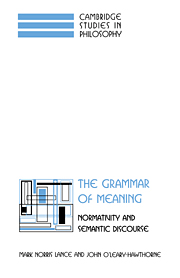Book contents
- Frontmatter
- Contents
- Acknowledgments
- Introduction
- PART I THE PLACE OF MEANING TALK IN SOCIO-LINGUISTIC PRACTICE
- PART II NATURALISM AND MEANING TALK
- 4 The epistemology of meaning and the analysis of meaning
- 5 Robust meaning theories and canonical dispositions
- 6 Reduction and naturalism
- 7 Realism and factuality
- Bibliography
- Index
7 - Realism and factuality
Published online by Cambridge University Press: 05 December 2011
- Frontmatter
- Contents
- Acknowledgments
- Introduction
- PART I THE PLACE OF MEANING TALK IN SOCIO-LINGUISTIC PRACTICE
- PART II NATURALISM AND MEANING TALK
- 4 The epistemology of meaning and the analysis of meaning
- 5 Robust meaning theories and canonical dispositions
- 6 Reduction and naturalism
- 7 Realism and factuality
- Bibliography
- Index
Summary
The questions “What is length?”, “What is meaning?”, “What is the number one?”, etc., produce in us a mental cramp. We feel that we can't point to anything in reply to them and yet ought to point to something. (We are up against one of the great sources of philosophical bewilderment: a substantive makes us look for a thing that corresponds to it.)
Ludwig Wittgenstein, The Blue Book, p. 1REALISM AND THE PHILOSOPHY OF LANGUAGE
We have argued that a certain sort of metaphysical project – that of discovering what naturalistically constitutes truths about meaning – is almost certainly doomed to fail. Relatedly, we have urged in Part I of this book that both the conjecturalist and the descriptivist picture of meaning discourse are misleading. Our emphasis in the rejection of these pictures is rather different from that of our predecessors, however. While the most famous critics of this historical tradition – Quine in his critique of the myth of the museum, Sellars on the myth of the given, and Rorty on the mirror of nature – emphasize the notion of description as it functions primarily in the context of broad philosophical theory, we focus our critique on more workaday, more immanent notions. That is, while we certainly agree that language should not be understood in general in terms of some special relation to reality articulated by some correspondence-like term of philosophical art, we do not deny that there is some less haughty sense in which, say, description is a genuine linguistic phenomenon worthy of study.
- Type
- Chapter
- Information
- The Grammar of MeaningNormativity and Semantic Discourse, pp. 373 - 435Publisher: Cambridge University PressPrint publication year: 1997



